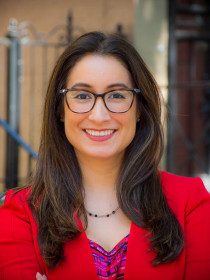
Jennifer E Cossyleon
Connect with Jennifer
About Jennifer
Cossyleon's research focuses on local social movements; urban poverty and inequality; and race, class and gender through community engaged methods. Overarching themes in Cossyleon's writings include how women of color and returning citizens contest marginalization through collective action; how housing and criminal justice policies contour the lives of the most oppressed groups, and how kinship is deeply embedded and constructed through group mobilization. Cossyleon is the Chair Elect of the Thomas C. Hood Social Action Award Committee for the Society for the Study of Social Problems, a former Advisory Board Member for Loyola University's Center for Urban Research and Learning, and a current Mellon/ ACLS Public Fellow at Community Change.
Contributions
U.S. Citizenship and Immigration Fee Schedule Rule Change
In the News
Publications
lluminates how collective action shapes the kinship relationships of women of color leading a local restorative justice movement in Chicago Uses forty-seven in-depth interviews with community organizers and fifteen months of participant observations of local collective action as evidence, I highlight the intersecting processes of collective action and family life. Findings elucidate how leaders in the study, most of whom were African American and Latina mothers and grandmothers, coproduced com-munity organizing and family life.
Studies how such discrimination operates, and the intermediaries who engage in it: landlords. Discusses how a fundamental assumption of racial discrimination research is that gatekeepers such as landlords are confronted with a racially heterogeneous applicant pool.
Documents how researchers and members of a nonprofit community organizing institution collaborated on a survey to understand debt, including the types, the amount, and the social consequences of debt, for economically marginalized communities of color in Chicago. Begins with the goal of impacting state and city-level policy, this Participatory Action Research built on the strengths of community members and researchers to develop research questions and survey instruments, formulate an implementation plan, and summarize results.
Notes much philanthropic and academic interests focuses on the quantifiable outcomes and impacts of collective action. Turns inward to the experiences of local social movement participants, Black and immigrant Latina mothers in Chicago. Illuminates how marginalized mothers of color contest the individualization of social problems through grassroots community organizing, gaining collective purpose and voice through the process and how we must rethink our narrow measures of movement "success."
Examines African American and Latina low-income mothers involved in local family-focused community organizing, called "motherleaders." Finds their engagement transformed their everyday lives, perceptions, and relationships. Finds motherleaders' personal narratives highlight how their experiences and understandings of community organizing are inseparable from their intersecting identities and how this type of civic engagement has the propensity to alter the lives of marginalized groups far beyond the publicly stated goals of organizations.